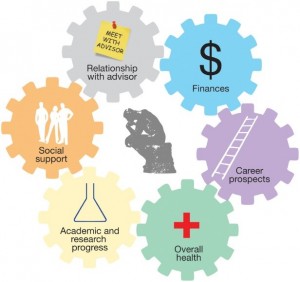Core Programs in the Graduate School extends a warm welcome to all new and returning graduate and professional students to the UW—Bothell, Tacoma, and Seattle. Whether you are enrolled for a year, a few years, or several, we acknowledge that it takes time to settle into a new city, work rhythm, and culture. Even for those of us who have lived in the Pacific Northwest for many years, we are still discovering new places and making new connections.
For those of you who are returning to campus, we truly hope you had opportunities to re-energize during the summer so you can move forward with your academic, professional, and interpersonal goals. We also appreciate that many of you are dreaming about and planning for life beyond graduate and professional school.
At Core Programs, we are here to root you on and support you as you work towards your goals — #UWGradSuccess. Here are some tips we hope you find useful, as you prepare for the first week of the new quarter:
You don’t have to know everything. Your Graduate Program Advisors are doing a fantastic job of organizing departmental orientations and welcome events, and they are sharing a wealth of information about your program requirements and campus resources. This is important for you, so you can plan ahead for your academic and professional goals. At the same time, we encourage you to acknowledge that you don’t have to know everything right now. Prioritize only the most important information and tasks you need to learn and do now and make time to re-visit information about your program and campus resources later (next week, next month, next quarter, etc.) Use an Individual Development Plan (IDP), so you can set goals for yourself with notes like “explore…” or “find out about…”. It takes one step at a time to make progress and figure out what’s next. Be open and curious.
Find your community. The University of Washington is a big place, with three campuses and multiple offsite research locations. We know that a feeling of belonging is critical to your success as graduate and professional students. It makes a difference to find and connect with people that can support your whole self—and not just your role as a graduate or professional student. To help you find your community, check out the list below of upcoming welcome events and orientations.
Practice asking for help. Throughout your time at UW, seeking guidance and feedback on your studies, professional pursuits, and interpersonal goals is also vital to your success. The trick is knowing when and how to ask for help. Maybe you’re unsure if you’re critically engaging with course readings in the most effective and efficient ways. Be proactive, and send an e-mail to a second or third year student in your program, and ask if they can meet for coffee to go over your understanding of one of the readings. You might learn new study tips that will make your life easier. When you’re a new student, reaching out to a peer can be a more comfortable option rather than approaching faculty. Just remember that you were selected out of many applicants to be in your department, so know that you belong here.
You will be hearing from us every two weeks with these e-newsletters. Add cpinfo@uw.edu to your e-mail contacts, to make sure our newsletters arrive in your inbox. You’ll also be hearing from the Graduate School every other week with the Graduate School Digest–a fabulous collection of events, resources, and quick tips for making the most of your graduate student experience. Check out our Core Programs facebook page and the UW Graduate Student facebook page for more.
Best Regards,
Kelly, Jaye, and Ziyan
Core Programs Team
